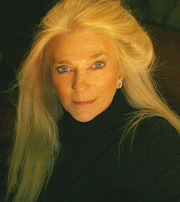Both Sides, Now and Then
Music icon and anti-war champion Judy Collins, who performs this month in Galveston, talks about the ’60s, gays and the Episcopal Church, and hope and healing. Oh, and the “Lavender Cowboy.”

If there’s one thing that differentiates the immoral 21st war in Iraq from the immoral 20th-century war in Vietnam, it’s the art of anarchy that both conflicts inspired. Today, military men and women trade iPod clips of anti-war comedy of Bill Maher, Lewis Black, and Jon Stewart. In the ’60s, they traded cassettes of anti-war music of Bob Dylan, Jimi Hendrix, and The Who.
And Judy Collins.
The quintessential folksinger with the long, golden mane and the nylon-stringed guitar, Collins spent her early performing years in the tiny bars and coffeehouses (one, notably called the Old Glory Hole Restaurant, in Denver) where poets, musicians, artists, and long-haired hippie freaks banded together, seeking to raise their collective consciousness through folk music.
It was her version of Joni Mitchell’s “Both Sides Now” that brought her mainstream acclaim in 1967. Even today, it is a tune often requested by transgender patrons still banding together in tiny bars and coffeehouses, seeking to raise their collective consciousness through folk music.
“No, I didn’t know about that,” Collins said in a recent phone interview, learning of the trans-twist to her most famous recording. “But I’m sure it happens. It would make sense.
“Joni will be glad to notice that.”
When Collins played Carnegie Hall in 1962, ticket prices topped out at $5.50. Now 68, Collins has just released Judy Collins Sings Lennon & McCartney, her 44th album, on Wildflowers Records, the recording company she birthed in 1999.
The singer/songwriter/studio mogul has in recent years added the title of author to her résumé, though not necessarily by choice. Collins penned Sanity and Grace, A Journey of Suicide, Survival and Strength (Penguin Group, 2006), following the 1992 suicide of her 33-year-old son, Clark. She released a follow-up book, The 7 T’s: Finding Hope and Healing in the Wake of Tragedy (Tarcher), earlier this year.
“If you’re a survivor of suicide, you learn a lot of things about suicide prevention within that context of getting through the event,” Collins said. “You’re not only facing your own personal sorrow and loss, but you’re also facing down a taboo which says, ‘It didn’t happen, we don’t talk about this.’” The church condemns you—also, the state.
“You know, we’re still facing a lot of old, and still very active, ghosts.”
While touring in promotion of the Lennon & McCartney disc, Collins is also working on a screenplay “about landmines and politics,” she said, describing it as a multigenerational look at “the folk world and the armaments world and how they come together in a particular group of people’s lives.”
Before bringing her concert (with the similarly controversial Smothers Brothers) to the Grand 1894 Opera House in Galveston on November 10 and 11, Collins chatted with OutSmart about her music, the ’60s, and defying the 2000 Episcopal Convention for its then-non-inclusive stance on gays and lesbians in the priesthood.










